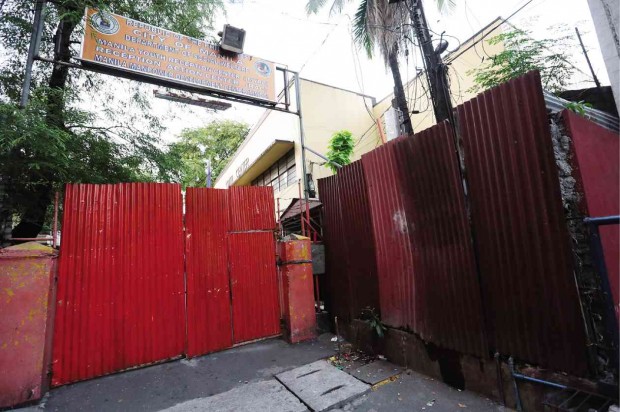
UNWELCOMING From outside, the RAC in Ermita, Manila, hardly appears to be a place of care. GRIG C. MONTEGRANDE
MANILA’S shelter for street dwellers—which critics likened to a “concentration camp” in 2014 when reports emerged of children being neglected or abused—is finally up for renovation.
Manila Department of Social Welfare head Arnold Pangan said the city’s Reception and Action Center (RAC) will be receiving P5 million for its upgrade from the national government, through the Department of Social Welfare and Development (DSWD), plus P2 million from City Hall for its antipoverty programs.
In preparation for this makeover, RAC is now serving only as “drop-off point”—and not a long-term shelter—for vagrants picked up from the streets. “For the meantime, street dwellers are being taken [to RAC] only to be fed, cleaned and interviewed. We then transport them right away to Boystown,” Pangan told the Inquirer in an interview last week.
The Camada Building inside the Boystown Complex, which is located in Marikina but is run by the Manila City government, now “assumes the role of the RAC” and has taken in about 350 wards, he added.
Remember ‘Frederico?’
Located on Villegas Street in Ermita, a five-minute walk from city hall, the RAC came under fire from welfare groups in November 2014 when a photo of an extremely malnourished boy lying naked on the pavement inside the facility went viral.
The photo was taken a month earlier by Catherine Scerri, deputy director of Bahay Tuluyan, a nongovernment organization which promotes children’s rights.
Scerri then remarked that her colleagues were so shocked by what they saw that they compared RAC to a “concentration camp.”
The appalling condition of the boy named “Frederico” and the death of another minor reportedly at the hands of fellow RAC wards sparked a public outcry and prompted an investigation by the DSWD.
The department later described the center to be “overburdened” and unfit to accommodate vagrant children in the long term.
Told of the RAC wards now being moved to Boystown, Scerri said the facility in Marikina may actually be worse.
“Children and adults who have been released or have escaped from Boystown claim it is extremely overcrowded, under-resourced and like a jail,” Scerri said.
Pangan confirmed that there had been escapes—and that in at least one case, bribery was involved.
“We found out from one [ward] who got out last week, but whom we eventually recovered, that he paid one of the other street dwellers inside to help him escape. Some of them are apparently making money out of this. We’re investigating the matter and considering using as a witness the individual who paid his way out,” he said.